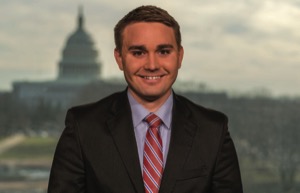
Director Alex Schuman on his new documentary about the historic civil rights battle that led to the legalization of same-sex marriage in the United States.
With the nomination, and likely confirmation, of Neil Gorsuch to the Supreme Court, many LGBT activists worry that we are one ‘religious liberty’ case away from dismantling the 2015 landmark ruling that constitutionalized same-sex marriage. That despite the court’s commitment to stare decisis – a legal doctrine in which a decision previously reached by a court is used as authority in all future cases that are based on the same basic circumstances or facts – this court in particular will not hesitate to overturn Obergefell v. Hodges, the case in which the Court held that the fundamental right to marry is guaranteed to same-sex couples, using the legal chicanery that is, as the Right so defiantly calls it, religious liberty.
But before we get too worked up about something that hasn’t happened yet, it’s important to reflect on just how far we’ve come since the 1993 Hawaii Supreme Court decision in Baehr v. Lewin that declared that state’s prohibition of same-sex marriage to be unconstitutional.
And Iowan Alex H. Schuman has done just that in his superb documentary, Love v. Kentucky. The title is actually an amalgam of two distinct cases both out of Kentucky. In the first, Bourke v. Beshear, a U.S. district court found that the Equal Protection Clause requires Kentucky to recognize valid same-sex marriages from other jurisdictions. In Love v. Beshear, the same court found that this same clause renders Kentucky’s ban on same-sex marriage unconstitutional. Both decisions were stayed by the Sixth Circuit Court of Appeals which covers Kentucky, Michigan, Ohio and Tennessee.
But while the facts of the case are now well known, Schuman has deftly captured the emotions and thoughts of the people involved – including some very colorful attorneys – that have helped blaze a trail for future same-sex couples. We spoke with Alex on the making of the documentary and his own views on the state of same-sex marriage today.
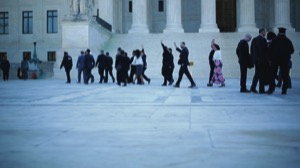
San Diego LGBT Weekly: With so many moving parts to the same-sex marriage movement, how did you decide to focus on the particular aspects of the events depicted in your documentary? Also, was there a particular event or events that lit some internal fire inside you that said this story needed to be told?
Alex Schuman: I was working as a television reporter in Louisville, Ky. Part of the case had already been filed when I went with Tim Love and Larry Ysunza when they applied, and were denied, a marriage license in 2014. They were such kind people. The story really stuck with me and eventually, after I was finished with our first film, Drop by Drop, I reached out and asked their attorneys if anyone was documenting the case as a film. They said no and I couldn’t pass up a chance to capture history. My producers and I were drawn to the Kentucky case as being an area where the arguments about marriage equality are very much alive and where many people are still polarized today.
It was only in 2004 that Kentucky had a popular vote to amend their constitution in such a way to prohibit these couples from marrying. Yet, Louisville boasts a large, vibrant LGBTQ community. Kentucky, to us, embodies a unique microcosm of our country in that way. We knew many people would relate to the very issues Kentucky was taking to the national scene. We ultimately chose to include attorneys from the other three states, too, because we wanted to create something that could serve as the best historic account of what happened on a local level. [And] there’s no narrator because it’s their story to tell.
Were you surprised by the “in-fighting” between the various lawyers about who would be the main oralist at the Supreme Court?
I was a bit surprised by the intensity of the argument, but when you think about it, no one should be surprised. These were more than 40 different attorneys who each dedicated enormous amounts of time and sometimes extensive personal resources to their own cases. They each believed they were operating in the best interest of their clients, which is exactly what they’re paid to do. I would’ve been skeptical of any claim that a large group of professional arguers, facing one of the most daunting cases of their career, were sitting around singing Kumbaya and holding hands without any dissenting opinions. We certainly learned a lot about how these cases evolve and interact before they’re presented to the Supreme Court. That’s another thing that we feel makes our story unique.
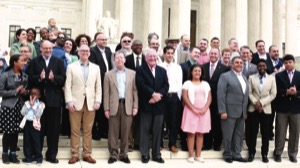
Some have argued that same-sex marriage is a white construct, that there was no overwhelming push by the black and Latino (and even the Asian) communities to push for equality in marriage. Do you agree with that?
I can only speak to our interactions with those from the movement we met for the film. They did not speak with us about this and all I can contribute is that they certainly seemed to feel that equality for one meant equality for all. Of course, the same-sex marriage movement is not immune to all the complicated factors and realities that impact other political issues.
There’s a gap of about ten years – say 2004 to 2014 when very little was happening on the gay marriage front. What do you owe that to?
While little was happening on the national front, there were critical legal battles working their way up the system in many states. Several state courts and legislatures legalized same-sex marriage on a state level at this time. Keep in mind that by 2011 around nine states had legalized some form of same-sex marriage. And in that same year, the Obama administration stopped defending the Defense of Marriage Act. After that, many states saw their own laws either overturned by courts or through popular movements. I think that period only seems like little was happening because these couples and the movement as a whole had to build momentum.
Were there avenues of thought or plot points you felt you had to leave out for brevity/continuity’s sake?
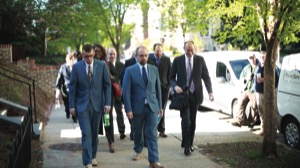
Each of these couples, from all four states, could have an entire film made about them. We had a difficult time including enough information so you got a sense of their story, made a connection, but that we did not get bogged down and slow down the film too much. We shot almost 90 hours of footage to make this 88-minute piece. The film also gives people a chance to relive the oral arguments made at the Sixth Circuit Court of Appeals and the U.S. Supreme Court. There were a lot of great moments we wanted to include from those arguments, but were simply too long.
Do you feel same-sex marriage is here to stay or that we risk losing the right to marry someone of the same gender given the political climate?
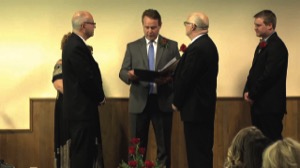
While I believe in the phrase ‘never say never,’ a series of really improbable events would need to take place to put same-sex marriage at risk in the current climate. For instance, while Supreme Court nominee Judge Gorsuch will be a conservative justice, he’s replacing an incredibly conservative justice. But I think immediate threats do exist, especially on the state level: I could see traditional marriage proponents extending protections to different-sex couples that are not offered for same-sex couples or in the form of the religious freedom movement. And don’t forget, Kim Davis is still the county clerk in Rowan County today, finishing out an elected term.
To learn about the documentary, watch the trailer or keep up with Alex, be sure to check out some of these links:











